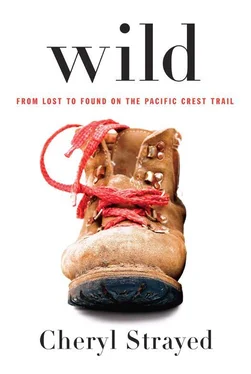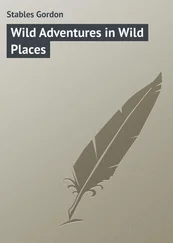Cheryl Strayed - Wild
Здесь есть возможность читать онлайн «Cheryl Strayed - Wild» весь текст электронной книги совершенно бесплатно (целиком полную версию без сокращений). В некоторых случаях можно слушать аудио, скачать через торрент в формате fb2 и присутствует краткое содержание. Год выпуска: 2012, ISBN: 2012, Жанр: Современная проза, на английском языке. Описание произведения, (предисловие) а так же отзывы посетителей доступны на портале библиотеки ЛибКат.
- Название:Wild
- Автор:
- Жанр:
- Год:2012
- ISBN:978-0-307-95765-8
- Рейтинг книги:4 / 5. Голосов: 1
-
Избранное:Добавить в избранное
- Отзывы:
-
Ваша оценка:
- 80
- 1
- 2
- 3
- 4
- 5
Wild: краткое содержание, описание и аннотация
Предлагаем к чтению аннотацию, описание, краткое содержание или предисловие (зависит от того, что написал сам автор книги «Wild»). Если вы не нашли необходимую информацию о книге — напишите в комментариях, мы постараемся отыскать её.
Wild — читать онлайн бесплатно полную книгу (весь текст) целиком
Ниже представлен текст книги, разбитый по страницам. Система сохранения места последней прочитанной страницы, позволяет с удобством читать онлайн бесплатно книгу «Wild», без необходимости каждый раз заново искать на чём Вы остановились. Поставьте закладку, и сможете в любой момент перейти на страницу, на которой закончили чтение.
Интервал:
Закладка:
I opened it up and read the first poem out loud, my voice rising above the sound of the wind battering the walls of my tent. I read it again and again and again.
It was a poem called “Power.”
5
TRACKS
I am technically fifteen days older than the Pacific Crest Trail. I was born in 1968, on September 17, and the trail was officially designated by an act of Congress on October 2 of that same year. The trail existed in various forms long before that — sections of it having been forged and pieced together since the 1930s, when a band of hikers and wilderness enthusiasts first took interest in creating a Mexico-to-Canada trail — but it wasn’t until 1968 that the PCT was designated and not until 1993 that it was complete. It was officially dedicated almost exactly two years before I woke that first morning among the Joshua trees that had stabbed me. The trail didn’t feel two years old to me. It didn’t even feel like it was about my age. It felt ancient. Knowing. Utterly and profoundly indifferent to me.
I woke at dawn but couldn’t bring myself to so much as sit up for an hour, lingering instead in my sleeping bag while reading my guidebook, still drowsy, though I’d slept for twelve hours — or at least I’d been reclining that long. The wind had awakened me repeatedly throughout the night, smacking against my tent in great bursts, sometimes hard enough so the walls whipped up against my head. It died down a few hours before dawn, but then it was something else that woke me: the silence. The irrefutable proof that I was out here in the great alone.
I crawled out of my tent and stood slowly, my muscles stiff from yesterday’s hike, my bare feet tender on the rocky dirt. I still wasn’t hungry, but I forced myself to eat breakfast, scooping two spoonfuls of a powdered soy substance called Better Than Milk into one of my pots and stirring water into it before adding granola. It didn’t taste better than milk to me. Or worse. It didn’t taste like anything. I might as well have been eating grass. My taste buds had seemingly gone numb. I continued to press the spoon into my mouth anyway. I’d need the nutrition for the long day ahead. I drank the last of the water in my bottles and awkwardly refilled them from my dromedary bag, which flopped heavily in my hands. According to The Pacific Crest Trail, Volume 1: California , I was thirteen miles away from my first water source: Golden Oak Springs, which, in spite of yesterday’s poor showing, I expected to reach by day’s end.
I loaded my pack the way I had the day before in the motel, cramming and wedging things in until nothing more would fit, then attaching the rest by bungee cords to the outside. It took me an hour to break camp and set off. Almost immediately I stepped over a small pile of scat on the trail, a few feet from where I’d been sleeping. It was black as tar. A coyote, I hoped. Or was it a mountain lion? I searched the dirt for tracks, but saw none. I scanned the landscape, ready to see a large feline face among the sagebrush and rocks.
I began to walk, feeling experienced in a way I hadn’t the day before, less cautious with each step in spite of the scat, stronger beneath my pack. That strength crumbled within fifteen minutes, as I ascended and then ascended some more, pushing into the rocky mountains, walking switchback after switchback. My pack’s frame creaked behind me with each step, straining from the weight. The muscles of my upper back and shoulders were bound in tense, hot knots. Every so often, I stopped and bent over to brace my hands against my knees and shift the pack’s weight off my shoulders for a moment of relief before staggering on.
By noon I was up over 6,000 feet and the air had cooled, the sun suddenly disappearing behind clouds. Yesterday it had been hot in the desert, but now I shivered as I ate my lunch of a protein bar and dried apricots, my sweat-drenched T-shirt growing cold on my back. I dug the fleece jacket out of my clothing bag and put it on. Afterwards, I lay down on my tarp to rest for a few minutes and, without meaning to, fell asleep.
I woke to raindrops falling on my face and looked at my watch. I’d slept for nearly two hours. I hadn’t dreamed of anything, hadn’t had any awareness that I’d been sleeping at all, as if instead someone had come up behind me and knocked me unconscious with a rock. When I sat up I saw that I was engulfed in a cloud, the mist so impenetrable I couldn’t see beyond a few feet. I cinched on my pack and continued hiking through the light rain, though my whole body felt as if it were pushing through deep water with each step. I bunched up my T-shirt and shorts to cushion the spots on my hips and back and shoulders that were being rubbed raw by my pack, but that only made it worse.
I continued up, into the late afternoon and evening, unable to see anything except what was immediately before me. I wasn’t thinking of snakes, as I’d been the day before. I wasn’t thinking, I’m hiking on the Pacific Crest Trail . I wasn’t even thinking, What have I gotten myself into? I was thinking only of moving myself forward. My mind was a crystal vase that contained only that one desire. My body was its opposite: a bag of broken glass. Every time I moved, it hurt. I counted my steps to take my mind off the pain, silently ticking the numbers off in my head to one hundred before starting over again. The blocks of numbers made the walk slightly more bearable, as if I only had to go to the end of each one.
As I ascended, I realized I didn’t understand what a mountain was, or even if I was hiking up one mountain or a series of them glommed together. I’d not grown up around mountains. I’d walked on a few, but only on well-trod paths on day hikes. They’d seemed to be nothing more than really big hills. But they were not that. They were, I now realized, layered and complex, inexplicable and analogous to nothing. Each time I reached the place that I thought was the top of the mountain or the series of mountains glommed together, I was wrong. There was still more up to go, even if first there was a tiny slope that went tantalizingly down. So up I went until I reached what really was the top. I knew it was the top because there was snow. Not on the ground, but falling from the sky, in thin flakes that swirled in mad patterns, pushed by the wind.
I hadn’t expected it to rain in the desert, and I certainly hadn’t expected it to snow. As with the mountains, there’d been no deserts where I grew up, and though I’d gone on day hikes in a couple of them, I didn’t really understand what deserts were. I’d taken them to be dry, hot, and sandy places full of snakes, scorpions, and cactuses. They were not that. They were that and also a bunch of other things. They were layered and complex and inexplicable and analogous to nothing. My new existence was beyond analogy, I realized on that second day on the trail.
I was in entirely new terrain.
What a mountain was and what a desert was were not the only things I had not expected. I hadn’t expected the flesh on my tailbone and hips and the fronts of my shoulders to bleed. I hadn’t expected to average a bit less than a mile an hour, which is what, by my calculations — made possible by the highly descriptive guidebook — I’d been covering so far, lumping my many breaks in with the time I actually spent walking. Back when my hike on the PCT had been nothing but an idea, I’d planned to average fourteen miles a day over the course of my trip, though most days I’d actually walk farther than that because my anticipated average included the rest days I’d take every week or two, when I wouldn’t hike at all. But I hadn’t factored in my lack of fitness, nor the genuine rigors of the trail, until I was on it.
Читать дальшеИнтервал:
Закладка:
Похожие книги на «Wild»
Представляем Вашему вниманию похожие книги на «Wild» списком для выбора. Мы отобрали схожую по названию и смыслу литературу в надежде предоставить читателям больше вариантов отыскать новые, интересные, ещё непрочитанные произведения.
Обсуждение, отзывы о книге «Wild» и просто собственные мнения читателей. Оставьте ваши комментарии, напишите, что Вы думаете о произведении, его смысле или главных героях. Укажите что конкретно понравилось, а что нет, и почему Вы так считаете.












